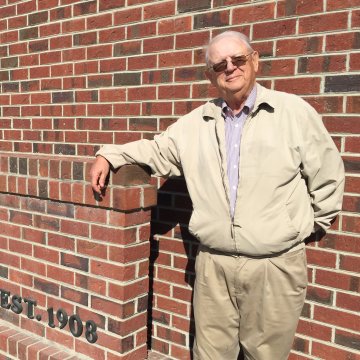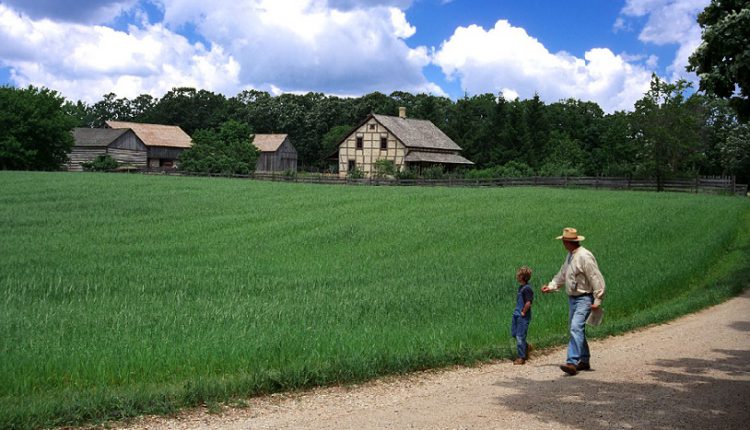John Howard’s deep run roots
Roots run deep in eastern North Carolina. John Howard, 77, owner of J.C. Howard Farms, Inc., has built his family’s farming enterprises from humble beginnings in tobacco growing to becoming a powerhouse in pork production (with 27,000 sows), row-crop farming, timber production, and John Deere dealerships.
Lately, the Deep Run native may be most well-known as Vivian Howard’s dad. Vivian is the Peabody Award-winning cocreator of the PBS TV show A Chef’s Life, and author of the New York Times bestseller Deep Run Roots.

–My grandfather was a tobacco farmer and my dad was a tobacco farmer. I grew tobacco up until 2006. That was the seed money for everything we’ve done. We had a good standard of living from the tobacco, but it had a lot of enemies, so we participated in the federal buyout and got out of the tobacco business.
In the meantime, we were expanding everything else we were doing. We stopped the tobacco and put our efforts to hogs, farming more land, and investing in John Deere facilities. We moved on from tobacco, which I think was a good thing.
Today we grow corn, soybeans, wheat, and cotton. We have about 5,000 acres in row crops and another 5,000 in forestland.
-Tell me about the pine enterprise.
–It is a 25-year cycle. You plant back just as quick as you can. You use good genetics, just like in the hog industry. We harvest year-round. We farm all around the Hofmann State Forest, which is good fertile land.
-You must see a future in the hog industry.
–I don’t think over my lifetime I could have done anything that would have been any better to me than the hogs have been. Like everybody else, we would like to be more integrated, but it’s just not in the cards. Here in North Carolina, we have a moratorium on growth, and this industry is mature. It’s probably sized up about right.
-Would you consider more acquisition?
–If it would add efficiency to what we are doing. Half of our growth or better has been from acquisition. It takes a lot of money to build a new facility. We are building a new sow farm now, but it’s just replacing some facilities that were more than 30 years old. Our grandchildren are building this facility.
-What is your succession plan?
–My wife, Scarlett, and I have four daughters, and two of them help us here. They all have stock in the company. We are working on bringing the grandchildren into the business. I’m going to give everyone who wants to come here a chance. If they want to work, they will have an opportunity.
-You own several John Deere dealerships in the state. How did you get into that?
–Back in the mid-1980s when grain farmers were having such a challenge, I bought interest in a John Deere dealership in the No. 1 agricultural county in America, Sampson County, North Carolina. It turned a profit pretty quick. Cotton took off in the late 1990s, with the need for cotton pickers and big tractors. We have 14 stores today.
-What type of equipment sells the most in North Carolina?
–Midsize tractors and combines, but our stores are linked pretty heavy to the biggest equipment.
-What do you think about trade policies right now?
–Every fifth trailer of hogs has to go abroad. This market has lost a tremendous amount, and it’s going to leave a lot of scars. We can deal with a bad trade agreement better than we can with no trade agreement.
-Farmers were very supportive of President Trump coming into office. Were you?
–Yes, I don’t deny it. I felt like we were going the wrong way business-wise, debt-wise, and policy-wise. I’m 77 years old. I’ve got to deal with moving this business to the next generation. The wealth of farmers is real estate. If you are not careful, a farm only lasts two generations. You do it and your kids do it, but the next generation has to sell it. I started to think about that in 1978 and have been doing something about it since then.
-You’ve seen presidents come and go.
–When Jimmy Carter was running for office, I took my wife and daughter to Plains, Georgia, to see him. Everybody was so excited. We sat on their front porch in rocking chairs with his family. We thought Jimmy Carter was going to be the godsend for agriculture. Instead, we got the embargo.
-Are you planning any changes to your farm based on what’s happening in Washington?
–No. I’m not a profit-and-loss farmer; I’m a balance sheet farmer. It’s all about building equity. My lifestyle is simple. I’ve spent all my life trying to build equity.
-Out of all your farm enterprises, which one’s closest to your heart?
–I like row crop farming, planting the seed. We started the day before yesterday [April 4]. I’m already looking for the corn to come up.
-Did your dad have hogs?
–Just a few, probably 50 sows.
-So you’re the one that really built the hog operation.
–Yes. We did most of our growth from 1992 to 1996. We got ahead of the moratorium. And then the acquisitions have come since then. This is the meanest business in the world to manage, let’s face it. You make money or you lose money so fast you don’t know where in the world it went.
-What was the most trying time for the farm?
–1999 was bad. $10 hogs. We were sitting in a meeting and it flashed on the DTN machine that Carroll’s Foods had been sold. Then 60 days later, Murphy Farms was sold. I came out of that time with one mission: to build a war chest.
-What is the biggest challenge today?
–Everyone in this business has a continuous struggle with labor, getting enough truck drivers, people to work on the hog farms, and such. It used to be we had extra workers, but now we are always short.
Agriculture needs people.
-Besides paperwork and meetings, what do you do in a typical day?
–I like to drive out and check the crops, and I visit one hog farm every day. I look in somewhere.
SEEDS by materials SuccessfullFarming
Головні новини Seeds та агроідеї для зростання вашого бізнесу в Telegram Facebook InstagramYoutube та Підписуйтесь!



